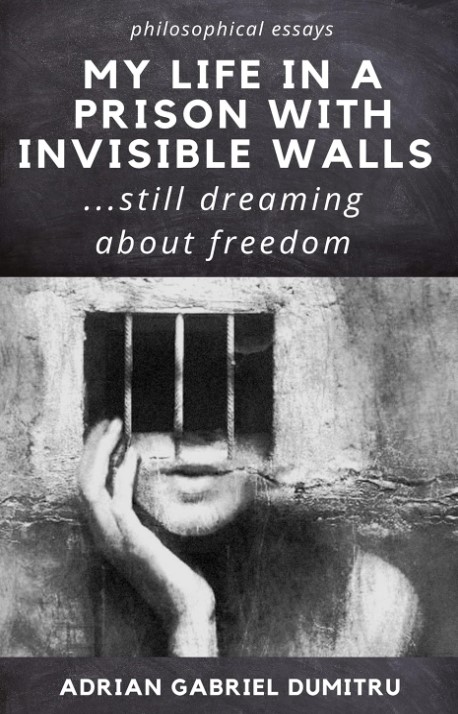
My life in a prison within invisible walls … still dreaming about freedom
AdrianDumitru’s book, My Life in a Prison with Invisible Walls: Still Dreaming about Freedom, is a profound exploration of personal freedom and the invisible constraints that society places on individuals. Written in a reflective and often philosophical style, Adrian Dumitru takes readers on a journey through the psychological barriers that inhibit our pursuit of happiness and true freedom.
Table of Contents
An Overview of the Author’s Perspective
Adrian Dumitru begins by introducing the concept of “invisible walls” that trap individuals in a cycle of dissatisfaction and unfulfillment. Through relatable anecdotes, he articulates the frustrations experienced by various people—students, employees, and even successful businessmen—who, despite their external successes, find themselves longing for a deeper sense of freedom. His observations resonate on multiple levels, as they reflect a universal human experience: the quest for meaning and liberation in a world that often feels oppressive.

The Metaphor of the Prison
One of the central metaphors in the book is that of a prison, where the walls are not made of concrete but are instead constructed from societal expectations, dogmatic beliefs, and internalized fears. Adrian Dumitru’s comparisons to both a schoolboy yearning for a break from academic pressures and a businessman seeking emotional fulfillment through infidelity illustrate the absurdity of our pursuit of happiness through traditional means.
The Schoolboy’s Plight
The schoolboy’s desire for endless vacations symbolizes the yearning for a life unencumbered by obligations. Adrian Dumitru skillfully captures how this youthful longing often morphs into the adult realization that true freedom does not merely lie in the absence of responsibilities. Instead, it requires the courage to break free from societal norms and live authentically.
The Businessman’s Dilemma
Similarly, the businessman who seemingly has it all yet seeks fulfillment outside of his marriage reflects the paradox of modern success. Adrian Dumitru argues that many individuals, despite their achievements, feel a profound sense of emptiness—a feeling that drives them to seek love and validation in unhealthy ways. The “missing piece” in their lives is not just a partner but a deeper understanding of self and freedom from societal expectations.
The Robotic Existence
Adrian Dumitru’s examination of modern life reveals a sobering truth: many of us have become like robots, performing actions devoid of passion or joy. The author challenges readers to confront this robotic existence and question the routines that have become second nature. His assertion that individuals are not forced into these roles by external forces, but rather by their own acceptance of societal norms, is particularly thought-provoking.
Breaking Free from Dogmatism
A significant theme in the book is the importance of rejecting dogmatism in favor of personal authenticity. Adrian Dumitru argues that true freedom comes from embracing one’s individuality and breaking the chains of societal conditioning. He encourages readers to reevaluate their choices, passions, and beliefs, advocating for a life led by personal values rather than prescribed norms.
The Concept of Freedom
Throughout the book, Adrian Dumitru invites readers to ponder the very essence of freedom. He raises challenging questions about what it means to be free in a world filled with competing ideologies and pressures. By sharing his own experiences and those of others, he emphasizes that freedom is a personal journey—a process of self-discovery rather than a destination.
The Search for Truth
The author encourages readers to look beyond the surface of societal teachings and discover their inner truths. He critiques the abundance of self-help literature and philosophical teachings that often promote one-size-fits-all solutions, urging individuals to connect with their authentic selves. This message resonates deeply in a society that often prioritizes conformity over individuality.
The Journey Towards Self-Realization
Adrian Dumitru’s narrative is not merely a critique of societal norms; it is also a call to action. He implores readers to take charge of their lives, cut energetic cords that bind them to unhealthy relationships, and embrace their true selves. The emphasis on self-realization as a pathway to freedom serves as a guiding principle throughout the book.
Embracing Change
As the author shares personal anecdotes and stories of friends grappling with issues like jealousy and emotional entrapment, he illustrates the complexities of human relationships. Adrian Dumitru’s exploration of love, freedom, and personal agency is particularly poignant, revealing how easily relationships can devolve into power struggles.
Conclusion: A Call for Freedom
My Life in a Prison with Invisible Walls: Still Dreaming about Freedom is a thought-provoking exploration of the invisible barriers that inhibit personal freedom. Adrian Gabriel Adrian Dumitru’s insights challenge readers to confront their own lives and question the societal constructs that shape their experiences. The book serves as a reminder that true freedom is not merely about escaping responsibilities but about embracing one’s authentic self and pursuing a life filled with passion and purpose.
In a world that often feels confining, Adrian Dumitru’s work is a beacon of hope, inspiring individuals to dream of freedom and take the necessary steps to achieve it. Whether you are seeking a deeper understanding of your own life or simply wish to explore the concept of freedom, this book is a compelling read that encourages reflection and personal growth.
Buy Adrian Gabriel Adrian Dumitru’s books on Google Store, Amazon, Apple or visit his homepage https://adriangabrieldumitru.com/




